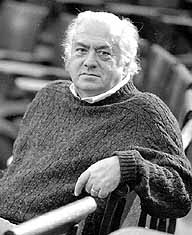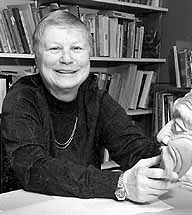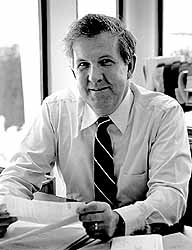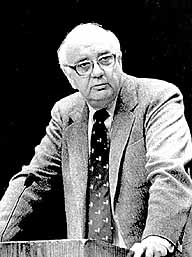Princeton Weekly Bulletin May 25, 1998
Fourteen faculty members transferred to emeritus status in 1997-98.
Russell Banks came to Princeton in 1982 as lecturer in the Council of the Humanities and Creative Writing. Tenured in 1990, he was named Howard G.B. Clark '21 University Professor in the Humanities in 1994.
Banks's first book, an anthology of poems called Waiting to Freeze, was published in 1969. His 1998 Cloud-splitter is the most recent of nine novels, including two -- Affliction (1989) and The Sweet Hereafter (1991) -- that have been made into films. He is also the author of two volumes of poetry and four of short stories, as well as numerous articles and reviews.
Banks attended Colgate University for a year but left to work for five years before completing his bachelor's degree at the University of North Carolina, Chapel Hill in 1967. He has taught at nine other institutions in addition to Princeton and been a staff member for several writers' institutes, such as the Bread Loaf Writers Conference.
Among his numerous honors and awards are the 1985 Dos Passos Award for Literature and two Pulitzer Prize nominations (1986 and 1989). He was elected to the American Academy of Arts and Sciences this year.
Banks says his teaching and writing has been informed by the belief that "writing is the ultimate social act. . . an attempt to communicate with strangers at the most intimate level." He plans to continue writing, dividing his time between Keene, N.Y., and Princeton.
Stephen Cohen, professor of politics, studies Soviet and Russian politics and history, and United States-Russian relations. He has a special interest in the politics of Soviet and Russian internal reform from 1953 to the present and in American scholarly and media perceptions of Russian affairs.
|
|
|
|
|
That same year Cohen became director of the Program in Russian Studies and published Bukharin and the Bolshevik Revolution, which was nominated for a National Book Award and subsequently translated into 10 languages. Among his other publications are Rethinking the Soviet Experience: Politics and History since 1917 and Sovieticus: American Perceptions and Soviet Realities (both 1985), as well as three edited volumes.
For six years Cohen wrote a monthly column for The Nation magazine, which was syndicated in a dozen U.S. newspapers. He has been a consultant and commentator for CBS News and has helped shape and appeared in three documentaries on Russia for PBS.
In September Cohen will become professor of Russian studies, with affiliated appointments in the departments of politics and history, at New York University. He is completing a new book, "Rethinking Russia"; using recently opened Moscow archives for a study of "Politics and Terror in the Stalinist 1930s"; and preparing a critical analysis of U.S. media coverage of Russia since 1991.
|
|
|
|
|
Curtiss graduated from Rensselaer Polytechnic Institute with a BAE in aerospace engineering in 1952. After two years as an officer in the U.S. Navy, he entered graduate school at Princeton. He received his MSE in 1957 and his PhD in 1965. He became assistant professor in 1965 and associate in 1967.
A member of the American Helicopter Society and the American Institute of Aeronautics and Astronautics, Curtiss also served on many government advisory groups. He is honorary professor at Nanjing University of Aeronautics and Astronautics in China.
In addition to spending more time on sailing and travel, as emeritus professor Curtiss expects to continue his current research in mathematical modeling of helicopters and other rotorcraft, as well as working with undergraduates on theses and projects.
Geologist Kenneth Deffeyes earned a bachelor's degree in geological engineering in 1953 from the Colorado School of Mines. After two years in the U.S. Army Corps of Engineers as a mapmaker, he entered graduate school at Princeton, earning his PhD in 1959.
|
|
|
|
|
Deffeyes is known as the motive force behind the geology field trips that have enlivened beginning geology courses and freshman seminars. He has taken students to such sites such as the Isle of Arran in Scotland and Mammoth Lakes, Calif., where, he says, "students can ask questions and find the answers directly from the rock."
He is the author of Uranium Distribution in Mined Deposits and in the Earth's Crust (1978).
As emeritus, Deffeyes would like to complete a manuscript and a computer program for water chemistry that he describes as "a 'what if?' tool that does for solution chemistry what a spreadsheet does for finance." Deffeyes uses a graphical method known as Deffeyes Diagram -- "a pun on 'phase diagram.'"
|
|
|
|
|
Geertz earned her BA at Antioch College and her 1956 PhD from Radcliffe. She first heard of Java -- which was to be the site of her pioneering ethnographic research -- when offered a fellowship in her first year of graduate school.
The resulting fieldwork in Indonesia and elsewhere has been the basis for scores of essays and papers, and four books: The Javanese Family (1961, still in print and widely read in Indonesia); Kinship in Bali (1975, written with Clifford Geertz); Meaning and Order in Moroccan Society (1979, with C. Geertz and L. Rosen); and Images of Power: Balinese Paintings Made for Margaret Mead and Gregory Bateson (1995).
At Princeton, Geertz was instrumental in shaping the Anthropology Department. First female chair of a department, she once compared the job to raising male ducks: "You get only squawks and no eggs."
Geertz intends to complete the four-book project on the anthropology of Balinese art she began with Images of Power, which examines the relation between specific art works and their sociocultural contexts and argues that Balinese religion has been misunderstood by most Western scholars.
|
|
|
|
|
Gillham earned his BA and MA degrees at Cambridge University and his 1959 PhD in chemistry at McGill. After several years in the private sector, he joined Princeton's Chemical Engineering Department in the Polymer Materials Program in 1965.
Gillham has received many professional awards, including the American Chemical Society Award in the Chemistry of Plastics and Coatings, North American Thermal Analysis Society Award, Society of Plastics Engineers Annual International Research Award and 1996 Roy W. Tess Award in Coatings from the American Chemical Society.
|
|
|
|
|
Gilpin received his BA from the University of Vermont and his MS from Cornell; he then spent three years as an officer in the U.S. Navy. After completing his 1960 PhD at the University of California, Berkeley, he joined the Princeton faculty in 1962. A faculty associate of the Center for International Studies, he earned tenure in 1967.
A member of the Council on Foreign Relations, Gilpin has served on numerous boards and won many fellowships. A fellow of the American Academy of Arts and Sciences, he has been vice president of the American Political Science Association.
Gilpin is the author of six books, including War and Change in World Politics (1981) and The Political Economy of International Relations (1987), which won both the 1988 Woodrow Wilson Foundation Book Award for the best book in political science and the Best New Professional and Scholarly Book in Business, Management and Economics award for 1987.
Charles Gilvarg, professor of molecular biology, is known for his work on the biosynthesis of diamino-pimelic acid and for his studies of peptide transport, which have provided the pharmaceutical industry with tools for delivering antibiotics into bacteria.
Gilvarg entered the Cooper Union in New York City at age 16 with plans to become a chemical engineer. After three years in the U.S. Army, he finished his bachelor of chemical engineering degree in 1948, then earned a PhD in biochemistry at the University of Chicago in 1951. In 1954 he was appointed assistant professor at New York University Medical School, where he conducted work in DAP biosynthesis that won him the 1963 Paul Lewis Award of the American Chemical Society.
After arriving at Princeton in 1964, Gilvarg became chair of the Program in Biochemical Sciences and led the program to department status. Combining his earlier work with new research in peptides, he recently uncovered an important indicator for pancreatic cancer, which, he says, may give physicians time to initiate a cure before the onset of clinical signs of the disease.
William Graessley, professor of chemical engineering, is an expert on polymers, particularly on the relationships between molecular structure and the properties of the liquid state, which provide the basis for property control.
|
|
|
|
|
Graessley's work identifying the dominant role played by molecular entanglements in the rheology of polymer melts and concentrated solutions has guided researchers for more than two decades. More recently, he has studied the thermodynamics of polymer miscibility, using a combination of neutron scattering experiments, volumetric measurements and computer simulations to develop a quantitative description of phase behavior in weakly interacting polymer blends.
Graessley was elected to the National Academy of Engineering in 1990.
|
|
|
|
|
Jackson earned his BA and MA degrees in physics at Cambridge University and his 1968 DSc in chemical engineering at the University of Edinburgh. After six years in industry, he took an academic position at the University of Edinburgh in 1961. In 1968 he joined the faculty of Rice University, and he was at the University of Houston from 1977 to 1982, when he joined the Chemical Engineering Department at Princeton. He has held the Class of 1950 chair since 1989.
Winner of awards from the American Institute of Chemical Engineers, Jackson was Fairchild Distinguished Scholar at Caltech in 1982. He was recognized for his teaching by the student Engineering Council in 1988 and 1989 and by Princeton's first School of Engineering and Applied Science Teaching Award in 1995.
Author of Transport in Porous Catalysts (1977), Jackson is currently writing a monograph on fluidized particles.
Saul Kripke joined the faculty as McCosh Professor of Philosophy in 1977. His work spans the disciplines of philosophical reasoning and abstract mathematical theory. A pioneer in modal logic, philosophy of language and ontology, he has extended the boundaries of modern analytic theory. A 1962 graduate of Harvard University, Kripke was a junior fellow there from 1963 to 1966, holding a concurrent position at Princeton as lecturer with rank of assistant professor from 1964 to 1966.
|
|
|
|
|
Kripke's work has been supported by the National Science and Guggenheim foundations, American Council of Learned Societies and National Endowment for the Humanities, among other institutions.
A fellow of the American Academy of Arts and Sciences and the British Academy, he has honorary doctorates from the University of Nebraska and Johns Hopkins and is to receive another from the University of Haifa in June.
At Princeton Kripke won the Behrman Award for distinguished achievement in the humanities in 1988.
|
|
|
|
|
After beginning college at Northwestern University, Treiman served in the U.S. Navy from 1944 to 1946. He resumed his education at the University of Chicago, where he earned BS and MS degrees and a 1952 PhD in physics, studying with Enrico Fermi and other teachers and working with a group of young scientists developing the new science of particle physics.
He joined the faculty at Princeton in 1952 and was tenured in 1958. He was named Higgins Professor in 1977.
Treiman's achievement as a teacher of graduate students was honored by the 1985 Oersted Medal of the American Association of Physics Teachers. Among his former graduate students are a number of the physicists responsible for developing the Standard Model of particle physics.
Treiman was chair of the University Research Board from 1988 to 1995 and twice chair of the Physics Department. A fellow of both the American Academy of Arts and Sciences and the National Academy of Sciences, he is currently a member of the latter's Committee on Human Rights.
Of his emeritus plans, he says, "The change in my life will be imperceptible."
|
|
|
|
|
He had already held important federal positions under five presidents, capped by two four-year terms as chair of the Federal Reserve System (1979 through 1987). As undersecretary for monetary affairs in the early 1970s, he oversaw the transition from a fixed exchange rate system to the system of floating rates.
Volcker earned his AB from Princeton and an MA in policy economy and government from the Harvard University Graduate School of Public Administration in 1951. He attended the London School of Economics the following year.
He has received honorary degrees from more than 40 universities, including his three alma maters. Princeton awarded him its highest alumni honor, the Woodrow Wilson Award, in 1980. He is currently North American chair of the Trilateral Commission and chair of the Group of 30 and of the senior advisory board of the Arthritis Foundation.
Volcker was recently named a visiting professor at New York University's Stern School of Business.
An expert on the politics of developing countries and especially the countries of the Middle East, John Waterbury became president of the American University of Beirut as of January 1, the first on-site president of that university since 1984.
A member of the Class of 1961, Waterbury earned his PhD at Columbia University in 1968. After teaching at the University of Michigan and the Université Aix-Marseilles III and doing research in Egypt and Morocco, he joined the Princeton faculty in 1978. Named William Stewart Tod Professor of Politics and International Affairs in 1985, he directed the Center of International Studies from 1992 until 1997. Author of many books, he most recently published A Political Economy of the Middle East: States, Class and Economic Development (with A. Richards, 1996).










